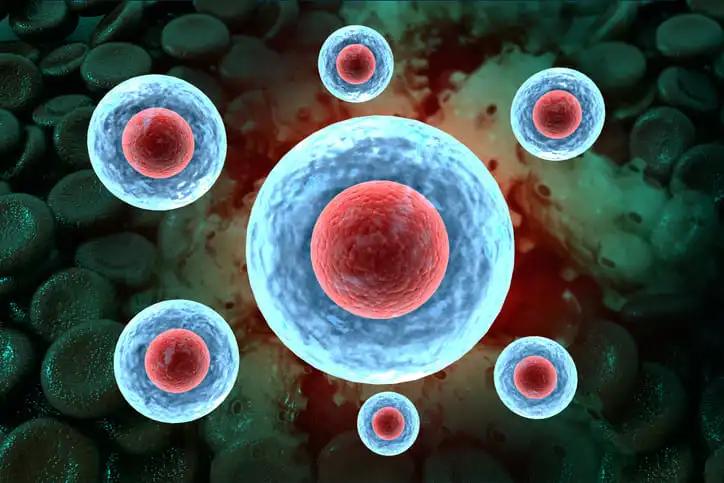KEY TAKEAWAYS
- The phase II DEDALO trial aimed to assess DPd’s effectiveness in treating relapsed MM patients carrying del(17p) chromosomal abnormality.
- Patients enrolled in the trial received continuous therapy with daratumumab, pomalidomide, and dexamethasone.
- The study enrolled 45 patients with relapsed or relapsed/refractory MM, with all patients having a del(17p) clone size >10% at diagnosis.
- The trial findings suggest that the daratumumab-pomalidomide-dexamethasone regimen shows promising efficacy in patients with relapsed MM harboring a del(17p) clone.
In the current staging criteria for multiple myeloma (MM), the deletion of the short arm of chromosome 17 (del(17p)) is a well-established, high-risk feature. Treating del(17p) multiple myeloma is complex due to the rapid development of chemoresistance and limited survival rate. The extent of the del(17p) clone correlates with prognosis, with the threshold value of 55%–60% having the worst prognosis. Approximately one-third of patients (pts) have a concurrent TP53 mutation that eliminates the protein’s function. The definition of TP53 biallelic inactivation is double-hit MM. Few studies have examined tailored treatments for del(17p) Multiple Myeloma. The IFM 2010-02 trial demonstrated that the pomalidomide-dexamethasone doublet is promising in this setting (Leleu et al., Blood, 2014). In contrast, immunotherapy is attractive because its lethal mechanism is independent of TP53-mediated DNA repair.
In this updated analysis of the phase II DEDALO trial (NCT04124497), researchers sought to determine the efficacy of daratumumab-pomalidomide-dexamethasone (DPd) in patients with relapsed multiple myeloma (MM) harboring a del(17p) clone. Critical eligibility criteria included relapsed or relapsed/refractory multiple myeloma; 3 prior therapy lines; del(17p) detected by fluorescence in situ hybridization (FISH) in 10% of plasma cells at any time during MM history; absence of refractoriness or intolerance to pomalidomide and an anti-CD38 monoclonal antibody; prior exposure to lenalidomide (Len). All participants gave informed consent. Unapproved drug use was implicated. Patients received continuous therapy with daratumumab (1800 mg sc or 16 mg/kg iv) weekly during cycles 1–2, every 2 weeks during cycles 3–6, and every 4 weeks after that; oral pomalidomide (4 mg, once daily on days 1–21); and oral or dexamethasone (40 mg once daily on days 1,8,15,22; 20 mg for those aged 75 years) at each 28-day cycle. The primary endpoint was minimal residual disease (MRD, 10-5) negativity detected by next-generation flow (NGF) and next-generation sequencing (NGS) within the first 12 treatment months. The most important secondary endpoints were progression-free survival, overall response rate, and survival.
There were 45 pts enrolled, and 60/29/11% of patients had International Staging System (ISS) stages I/II/III. At diagnosis, del(17p) clone size was >10% in all patients and 55% in 15 patients; t(4;14), t(14;16), del(1p), and 1q+ were observed in 7, 10, and 17 patients, respectively. The median number of prior therapy lines was one (range: 1-3); all patients had been exposed to Len, and 87% had been exposed to a proteasome inhibitor (PI). Four points attained MRD negativity by NGF, while NGS analysis is in progress. The ORR was 62%, with partial response in 13 instances, very effective partial response in 13 cases, and complete response in 2 patients. The median response time was 2.5 months. With a median follow-up of 14 months (6–29), the median PFS was 6.8 months (95% confidence interval: 5.8–13.3). By subgroup analysis, PFSwas: 6.5 mo in pts with del(17p) clone size <60% and 7.7 mo with del(17p) clone size ≥60% (HR 1.07, 95% CI0.53–2.15, P=0.85); 12.9 mo in pts with ISS I vs. 4.2 mo with ISS II-III (HR 2.50, 95% CI 1.24–5.07, P=0.011); 9.2 moin pts at first relapse vs. 6.3 mo beyond first relapse (HR 0.73, 95% CI 0.36–1.47, P=0.37); 6.5 mo in pts aged ≤65yr vs. 8.8 mo >65 yr (HR 0.78, 95% CI 0.38–1.63, P=0.52). 9. The median OS was not found. There were no new safety concerns observed. TP53 mutational analysis is ongoing.
Clinical Trial: https://clinicaltrials.gov/ct2/show/NCT04124497
Vittorio Montefusco, Anna Maria Cafro, Gloria Margiotta-Casaluci, Francesca Patriarca, Roberto Mina, Mattia D’Agostino, Anna Benedetta Dalla Palma, Rita Rizzi, Angelo Genua, Francesca Fazio, Laura Paris, ANGELO BELOTTI, Ilaria Rizzello, Concetta Conticello, Carmelo Carlo-Stella, Mario Boccadoro/DARATUMUMAB PLUS POMALIDOMIDE AND DEXAMETHASONE (DPD) IN PATIENTS WITH RELAPSED/REFRACTORY MULTIPLE MYELOMA AND 17P DELETION: UPDATED ANALYSIS OF THE DEDALO PHASE II TRIAL/Inc, M. G. (n.d.). DARATUMUMAB PLUS POMALIDOMIDE AND DEXAMETHASONE (DPD) IN PATIENTS… by Vittorio Montefusco. Library.ehaweb.org. Retrieved July 14, 2023, from https://library.ehaweb.org/eha/2023/eha2023congress/386724/vittorio.montefusco.daratumumab.plus.pomalidomide.and.dexamethasone.28dpd29.in.htmlf=menu%3D16%2Abrowseby%3D8%2Asortby%3D2%2Ace_id%3D2489%2Aot_id%3D27922%2Atrend%3D4016%2Amarker%3D4178



